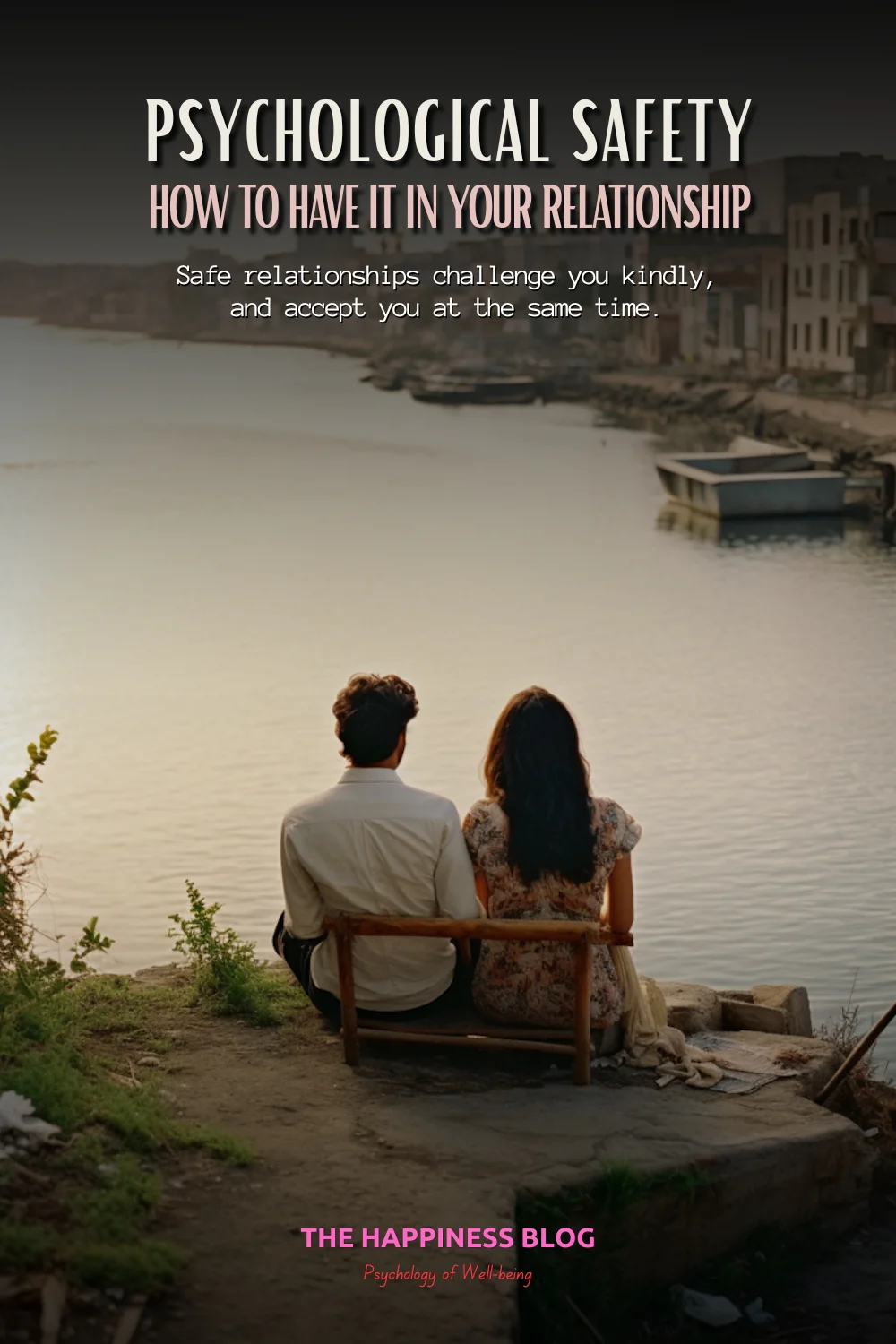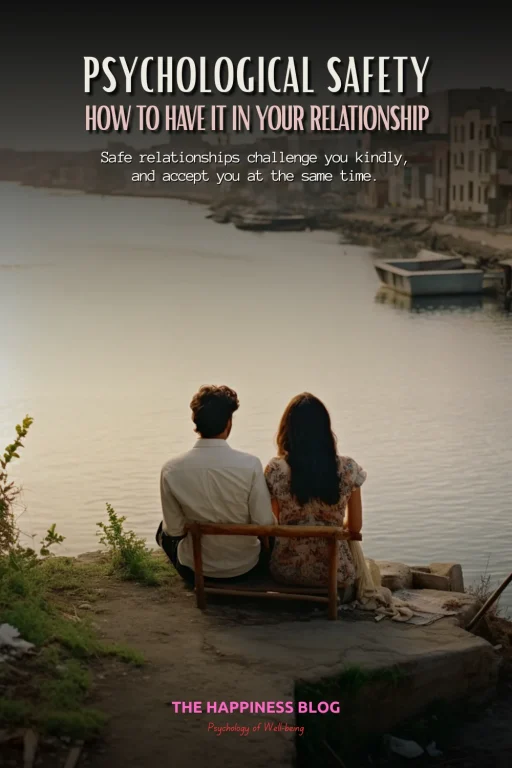Today's Sunday • 5 mins read
— By Dr. Sandip Roy.
Every healthy relationship needs psychological safety to grow and stay strong.
This safety lets both partners feel accepted and valued for their independent, sometimes divergent, views.
They communicate honestly and openly instead of always hunting for “the right words” out of fear of being dismissed or shamed.
“Psychological safety is the belief that one will not be punished or humiliated for speaking up with ideas, questions, concerns, or mistakes.” — Amy C. Edmundson
A psychologically safe relationship lets both people express thoughts, emotions, and concerns without fearing criticism, rejection, or punishment.
As Adam Grant explains,
“Psychological safety is not about withholding criticism. It’s about enabling people to speak up without fear. The goal is not to lower our standards. It’s to replace knee-jerk reactions with open-minded consideration. All ideas are welcome. Not all views are equally valid.”
How To Build Psychological Safety In Relationships
A psychologically safe relationship lets you share thoughts, doubts, or feelings without fearing judgment, ridicule, or punishment. You can be honest, even when the truth is uncomfortable.
These eight practices can help build psychological safety in a relationship:
1. Have Mutual Respect
Respect is the foundation of emotional safety.
It means recognizing your partner’s individuality, values, and choices even when you disagree. You don’t have to share the same opinions, but you do need to allow space for both to exist.
When respect is mutual, disputes feel less like battles and more like discussions. Over time, this creates a calm sense of equality in the relationship.
2. Choose Trust Over Control
You can’t have safety without trust.
When one person tries to control, test, or manipulate the other, trust disappears. A safe relationship gives both people room to be themselves without fear of criticism or rejection.
You don’t have to earn love by walking on eggshells, something that often happens in relationships with narcissistic partners.
The more trust replaces control, the more both people relax and connect.

3. Practice Emotional Honesty
Psychological safety allows emotional honesty without shame.
You can say “I’m hurt” or “I’m angry” without being told you’re overreacting. Honest expression prevents emotional buildup and resentment.
Each person takes responsibility for their own emotions rather than blaming or suppressing them. This makes hard conversations easier and the bond stronger.
4. Listen to Understand, Not to Win
Practice active listening. It’s listening with genuine attention and curiosity, so your partner feels seen and understood.
Don’t nod to signal agreement, but to show you’re paying attention.
Don’t listen only to find a pause to interject with your statements or opinions.
You can still respectfully disagree with everything they say. But first, hear them out without interrupting or judging.
When you listen to understand, not to defend, the other person feels emotionally safe to open up. And that deepens the relationship more than any perfect words.
5. Consistency and Reliability
Psychological safety grows when words match actions.
If someone promises support but reacts unpredictably, the other person learns to stay guarded.
Reliability doesn’t mean being perfect all the time; it means being dependable. It tells them that your words carry the weight of a sincere promise.
When each person’s behavior stays consistent over time, the other feels safe in emotional predictability. You start to feel secure, not cautious or anxious.
6. Empathy and Transparency
Being open about what you think and feel prevents misunderstandings and silent resentment.
Transparency builds trust, while empathy makes room for both perspectives.
When you respond with curiosity instead of defensiveness, your partner feels safe to share more.
Empathy means you understand their feelings and words without judgment.
Together, empathy and transparency protect honesty in your relationship.
7. Encouragement of Growth
True psychological safety encourages personal growth, not comfort alone.
You feel supported in becoming better, trying new things, and changing where needed.
Safe relationships challenge you kindly and accept you at the same time.
Growth may sometimes feel uncomfortable, but safety means you can stretch without fear of losing connection. That balance keeps the relationship alive and evolving.
8. Repair After Disagreements
No relationship is free from disagreement. What matters is how you repair after it.
Taking responsibility, apologizing sincerely, and working to restore calm rebuilds trust faster than avoiding the issue.
When both people know that disagreements won’t lead to humiliation or withdrawal, they stop fearing confrontation.
Trying to repair your relationship after small and big fights strengthens your bond against future hardships and disputes.
5 Signs of Psychological Safety
Psychological safety gives emotional security. You don’t fear your emotions will be dismissed, ridiculed, or weaponized against you. You freely express what’s real.
A relationship built on psychological safety often shows these five signs:
- Positive intent. You assume the other person means well, even during disagreements.
- Respect for individuality. You can think, feel, and act as you truly are, with no pressure to conform.
- Mutual curiosity. You want to understand each other’s thoughts and experiences, not correct them.
- Acceptance of imperfection. You both accept disagreements and flaws as part of human connection, not as signs of failure.
- Emotional openness. You can share your vulnerabilities, fears, and mistakes without fear of being judged, shamed, or punished.
Final Words
A safe relationship frees you from monitoring your every word and reaction. You relax into honesty, and that creates a quiet peace between you.
Psychological safety isn’t about removing discomfort. It’s about facing it together without risking love or respect.
Real safety lets both people evolve, not hide. When that balance exists, you can be vulnerable and imperfect and still feel accepted. And that’s emotional freedom.
√ Also Read: How To Be Happy: 20 Strategies From Positive Psychology
√ Please share it with someone if you found this helpful.
» You deserve happiness! Choosing therapy could be your best decision.
...
• Disclosure: Buying via our links earns us a small commission.
